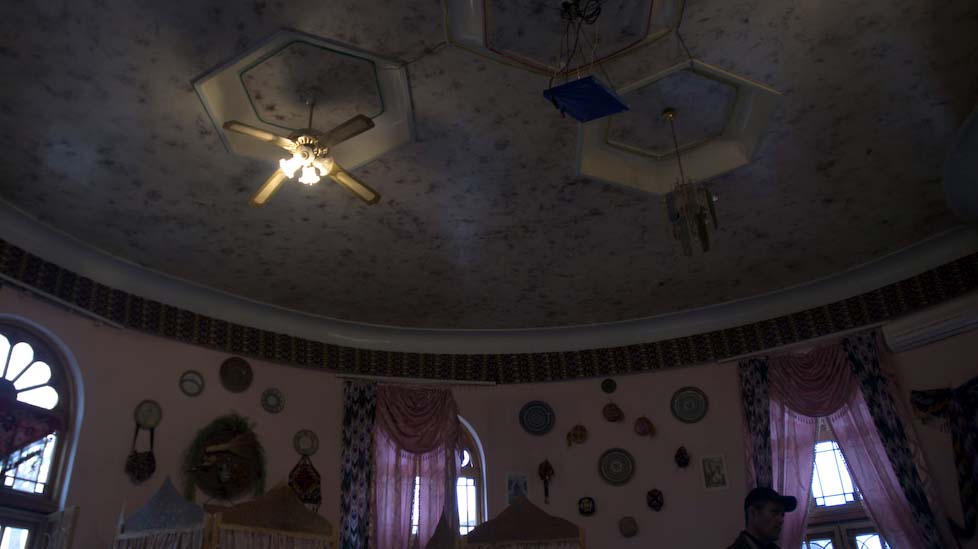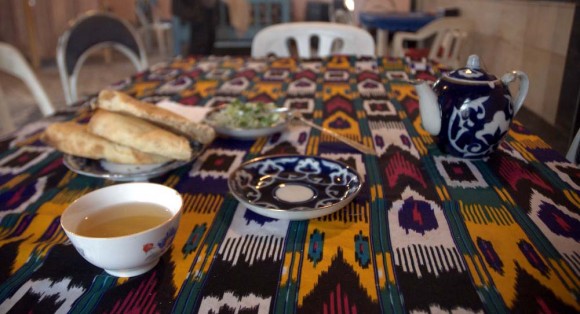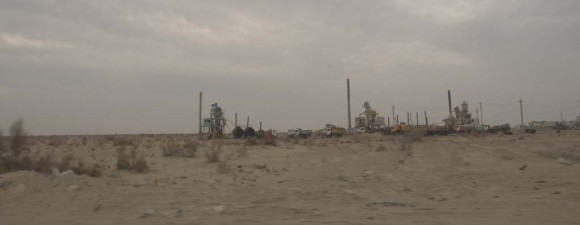The restaurant owner is welcoming and her eyes to the only remaining empty table in a room that has few.
In front of me three generations of the owner’s family have occupied the bulk of the seats and they’re ordering liberally. During the course of the evening the youngest daughters skip to and fro between the family meal and an impromptu sewing circle situated across the room. Screens have been set up to offer two of the tables a degree of privacy – positioned to restrict their line-of-sight to a television placed at the edge of a kitchen counter and beyond that to the working kitchen. With minimal local programming and music concert DVDs in such ready supply DVD-TV is the ambient background to everyday life – fulfilling a role that for many was previously played by radio. The TV shows a tastefully bleach blonde lady crooning to an live audience of thousands – a genre that my de-calibrated cultural radar places somewhere between the Bermuda triangle of Sayed Makawi and Nusfat Ali Khan and Samantha Fox. On the only remaining table three heavyset gents still wearing their leather overcoats and bushy hats have polished off the main course and have moved onto a 40% proof dessert.
As the owner passes the menu her smile literally lights up the room – reflections from a mouth lined with enough gold teeth to simultaneously impress a possie of south central homeboys and the guests of a upscale Dharavi wedding – not that you’re ever likely to find either group in same place at the same time. There only needs to be a slight overlap of understanding for the end result to look the same, even if the cultural relevance and the path to the end result is radically different.
My spoken Uzbek is basic and my ability to read the Cyrillic menu non-existent. She points, I nod and over time the food arrives. The menu reminds me of the challenges of localisation. It’s just a matter of translation, right? Except that language is highly political – as part of the process of re-asserting its Uz-ness Uzbekistan is moving away from (Russian) Cyrillic and returning to a roman script. The languages that are supported in your product are a reflection of where your brand sits in the ever changing political landscape and not all cultures and national boundaries are as stable as yours.
Goulash with wild rice and coriander arrives. There’s nothing like crossing a desert to whet the appetite, especially when the road conditions are less than stellar and you’ve spent a good part of the day nervously aquaplaning towards oncoming traffic. An early start to the day and the monotony of the engine induce a desire to doze but this is more than offset by the psychological need to keep one eye on the road. And what a road – Khiva to Bukhara skirts the Turkmenistan border before slicing through the Kyzylkum Desert. The really eager can continue their ‘plane beyond Bukhara to the Friendship Bridge that crosses into Afghanistan before hitting Mazar-e-Sharif. A journey for another day perhaps.
An elderly holy man enters the restaurant, hobbling from table to table arm outstretched for alms. A small denomination note is handed to him by one person from each of the tables, somehow fulfilling the social contract that says its OK for one person to give on behalf of others. What’s the difference between too much and not enough? I’d like to think that somewhere there’s a social networking site that has mastered the subtleties of this kind of giving, but in the current land grab I doubt it.
Enough writing for today – time to accept the invitation of dessert.
And Monocle has a lite reportage of Tajikistan.


